Android app development team: An ultimate guide to hire the best team
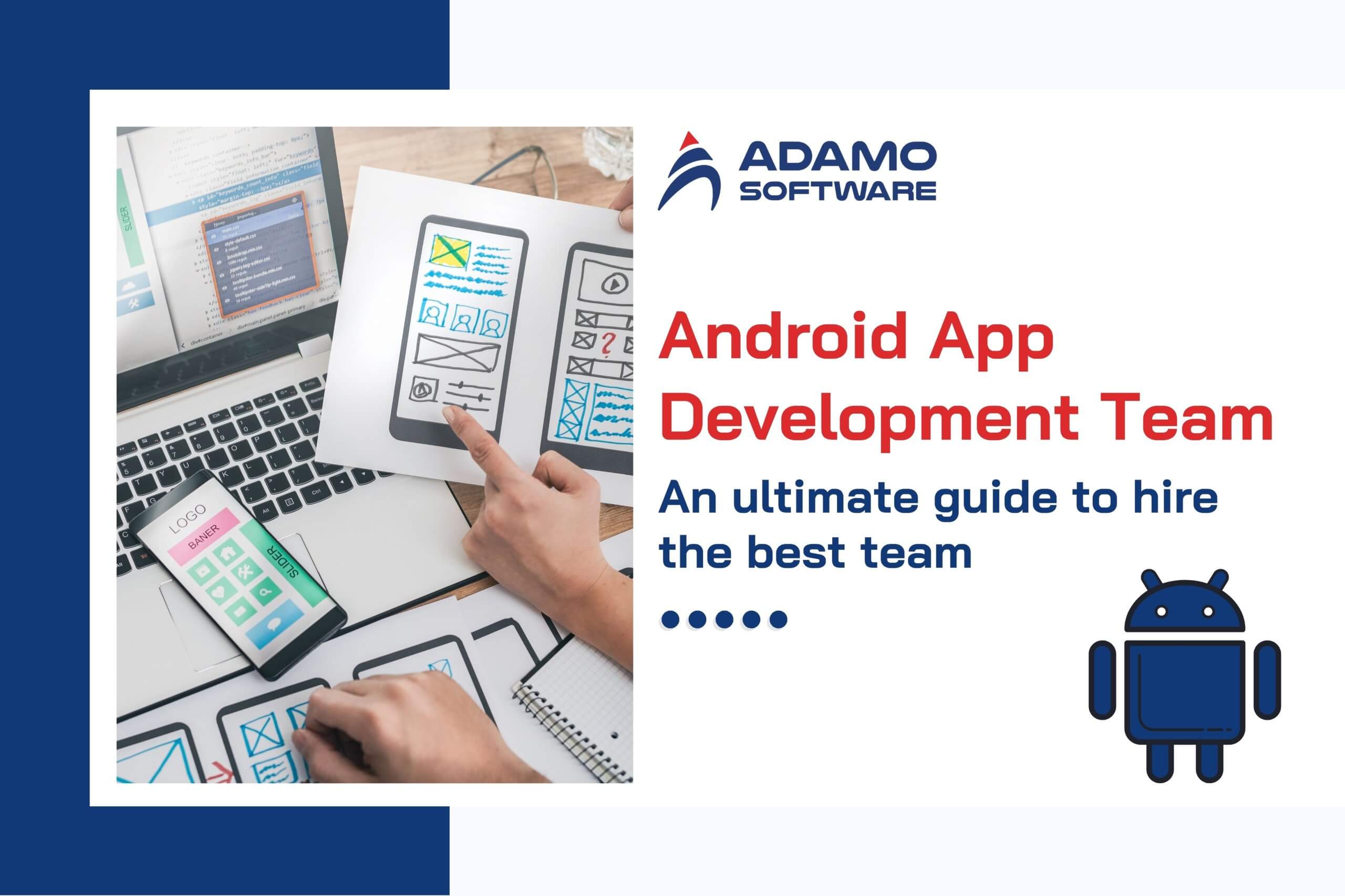
Developing a successful Android App involves considerably more than a tremendous idea. Developing a smartphone app for Android requires the right team that will translate your idea into a working application with a great interface. But how do you go about it to ensure that you hire the right people for the job? This guide discusses everything you would ever want to know. We start from the differences between iOS and Android app development teams to the various hire types and trends that will help you.
Exploring the positions that should be involved in the Android app development team, outlining the primary approaches to employ one. We will also provide guidance on how one can make the right decision. Moreover, you will find out what trends in the Android app development team are relevant in 2020 and why it is best to cooperate with our staff at Adamo.
When you get to the end of this guide, you will learn a step-by-step process of recruiting your Android app development team to help you build an application that would be outstanding in the now oversaturated market.
I. iOS vs Android app development team: Key differences
One of the initial questions to determine at the beginning of any mobile application development project is whether to develop for iTunes or Android. Depending on the decision made above, one gets a clear picture of the kind of development team required. Even though both seek to build applications that are easy to use and provide core functionality. The job of an Android app development team is markedly different from an iOS team.
1. Tools and Programming Languages
Generally, an Android app development team engages in the utilization of specific tools. The tools include Android studio software technologies and programming languages like Java or Kotlin. These are open-source technological platforms that allow for a great deal of flexibility and are highly customizable, they are usually developed by open-source communities. Therefore, iOS teams have their sets of highly specific technologies, including Xcode and Swift developed by Apple Inc.
2. Device Compatibility
Android-targeted applications are built to support a variety of devices that come with different dimensions, resolutions, and versions of the operating systems. This policy makes it compulsory for the Android app development team to dedicate time to balancing the application and its compatibility with different devices. On the other hand, by writing applications for iOS, developers are targeting fewer devices because Apple is a closed platform.
3. Development Costs and Timeline
Unlike the iPhone, there is a myriad of Android devices, and this means it always leads to more time and effort in the development and testing phases. Therefore, it might require more funds from the Android app development team than from the iOS teams. iOS teams often have more homogeneous environments in terms of hardware.
4. Target Audience and Market Share
Its counterpart Android continues to lead globally, especially in countries within Asia, Africa, and South America category. This means that an Android app development team, more often than not, develops with a wider and diverse consumer base in mind. While the iOS apps primarily focus on the users of specific markets like North America and Western Europe where Apple devices are common.
5. Flexibility and Customization
Due to the anonymity of Android, developers can compile very specific applications. An Android app development team can incorporate application-specific functionality and the application’s look and feel. iOS teams on the other hand operate under framework design and functionality by Apple company which may allow little or no customization.
To decide what platform your app should be developed it is necessary to determine:
- What your app’s objectives are;
- Who your target audience is;
- How much money can you spend on it?
Android groups are more versatile and reach a larger audience, and the iOS teams need less time preparing a project and have customers’ trust. Recognizing these features will enable you to identify proper employees to be involved in a certain task.
II. Key members that should be included in an effective Android app development team
To develop an out-of-box, efficient, and user-friendly Android app, there is a need for the development team to comprise certain special talents among the Android app developers. Both roles are important to facilitate the developmental procedures for the product from planning to launching. We will next discuss the primary members and their editors in further detail for a clearer understanding of the role.
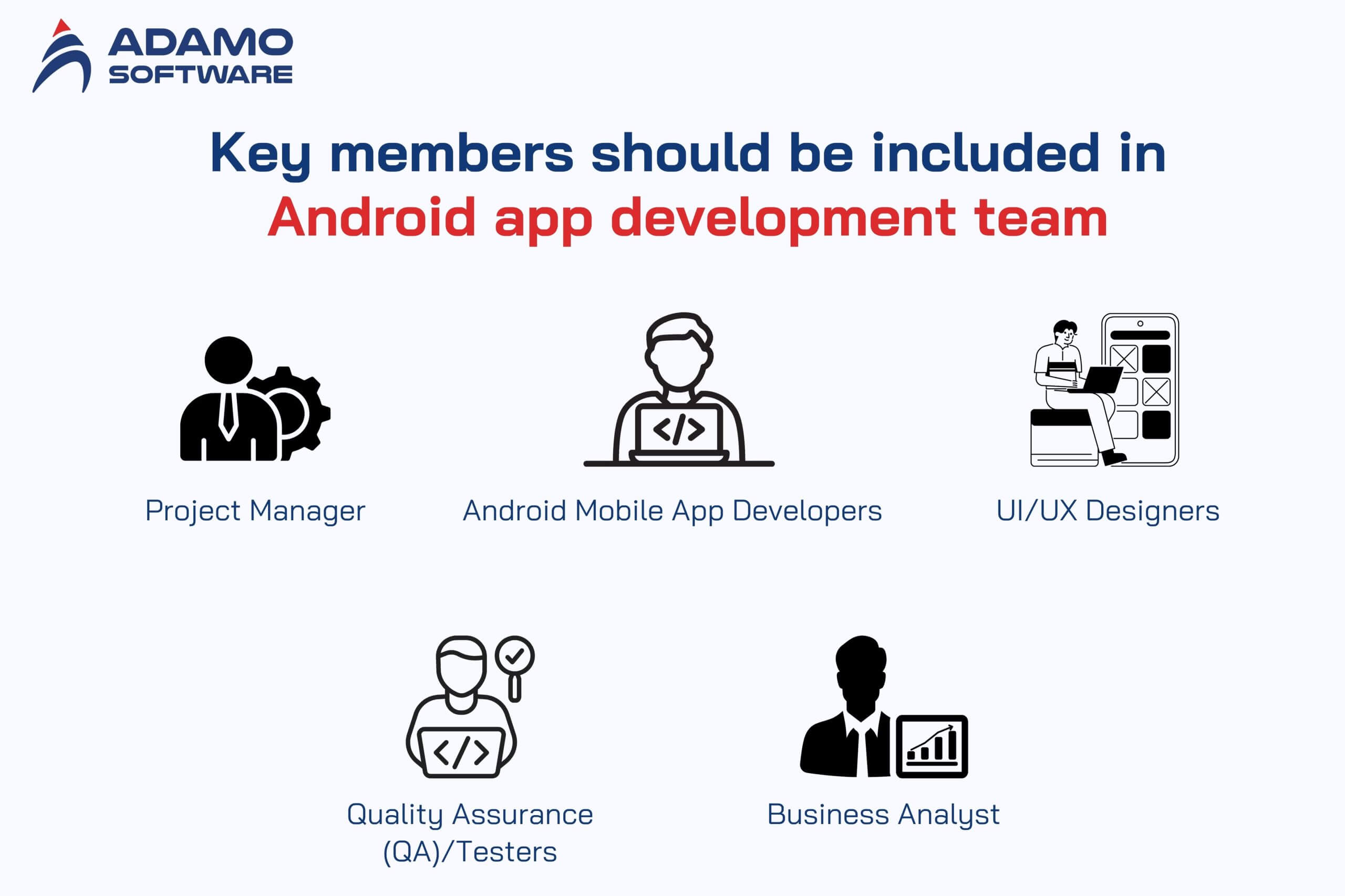
1. Project Manager
The head of the Android app development team is the project manager. Mortgage intermediaries bear the responsibility of scheduling and coordinating all the activities in the project.
- It involved the slicing of the project into several tasks.
- Providing the members of the respective teams with responsibilities and duties.
- Establish meaningful relationships with the clients to effectively
A good project manager makes it possible to see that the plan is and progresses with the team in case of any complications. They can easily set the technical specifications against organizational goals, hence guiding the project to meet the client’s needs.
2. Android Mobile App Developers
Android developers are the primary constituent of the Android development fraternity. Their job is to write the code that forms the Android application.
- The design of the features and functionalities of the racing app.
- The integration with various Android devices and the Android operating system.
- Purging and linking log files according to high-quality, near-best practice performance and security standards.
Android app development teams are also proficient in Java and Kotlin to create applications for the Android Program. This is directly linked to the quality and usability of the app; the more efficient and bug-free their code, the better the app. Android specialists can also fine-tune the app for battery use, speed, and popularity among users. Thus, they can provide the best experience in the already ruthless world of Android applications.
3. UI/UX Designers
The role of UI/UX designers is involved in the process of app designing and its general functionality. In the Android app development team, they design a good-looking app that can be easily understood by users.
- Creating layouts, buttons, and paths of navigation specific to Android users.
- Skinning or laying out examples of the app’s user flow or a wireframe.
- Ensure the app developed observes the Material Design of Android.
A skilled project manager ensures the team stays on schedule and addresses any challenges that arise. Their ability to balance technical requirements with business objectives makes them invaluable for keeping the project aligned with the client’s goals.
4. Quality Assurance (QA)/Testers
This is true because QA testers are the most important people in the development of an application as they release a bug-free application. They engage in testing the app, to see whether it meets the required quality of the product.
- Detection and rectification of potential errors in the codes and designs.
- Performance testing covering different devices and the Android operating system versions.
- Having the app developed to fit all essential standards of how an app should be secure and developed
They go a step ahead to test the app to guarantee that users will receive the best experience possible. In a way, QA testers reduce costs because issues are detected before they go further and become more difficult to solve after the app has been released.
5. Business Analyst
A business analyst bridges between the technical aspect and the business aspect of the project. They assist the Android app development team in knowing the client’s requirements for the app and how it meets the users’ requirements and the market.
- Research on potential users as a way of determining their needs.
- Consulting with stakeholders to determine various characteristics of the application and its objectives.
- Enabling informed decision-making in development.
They must guarantee that the app will be useful and useful to the people. Business analysts assist the team in defining goals, priorities, and effectiveness of the particular feature that sustains the organization’s revenue.
Everyone from designers to core programmers can get involved in developing an Android app and that too contributes to its success. The work should include the following rules:
- The project manager maintains good coordination;
- The developers lay the groundwork for the app;
- The designers design an interesting interface;
- The QA testers check for quality;
- The business analyst makes sure that the project aligns with the market needs.
In combination, they produce a set team that is capable of designing outstanding Android functions in the compounded market.
Also read: IOS app development team: Structure, skills and development process
III. 5 main ways to hire an Android app development team
A successful application can only be created by the right Android app development team. Regardless of whether you’re a new company or an old one, your choice of hiring strategy will define the app’s quality, time, and cost.
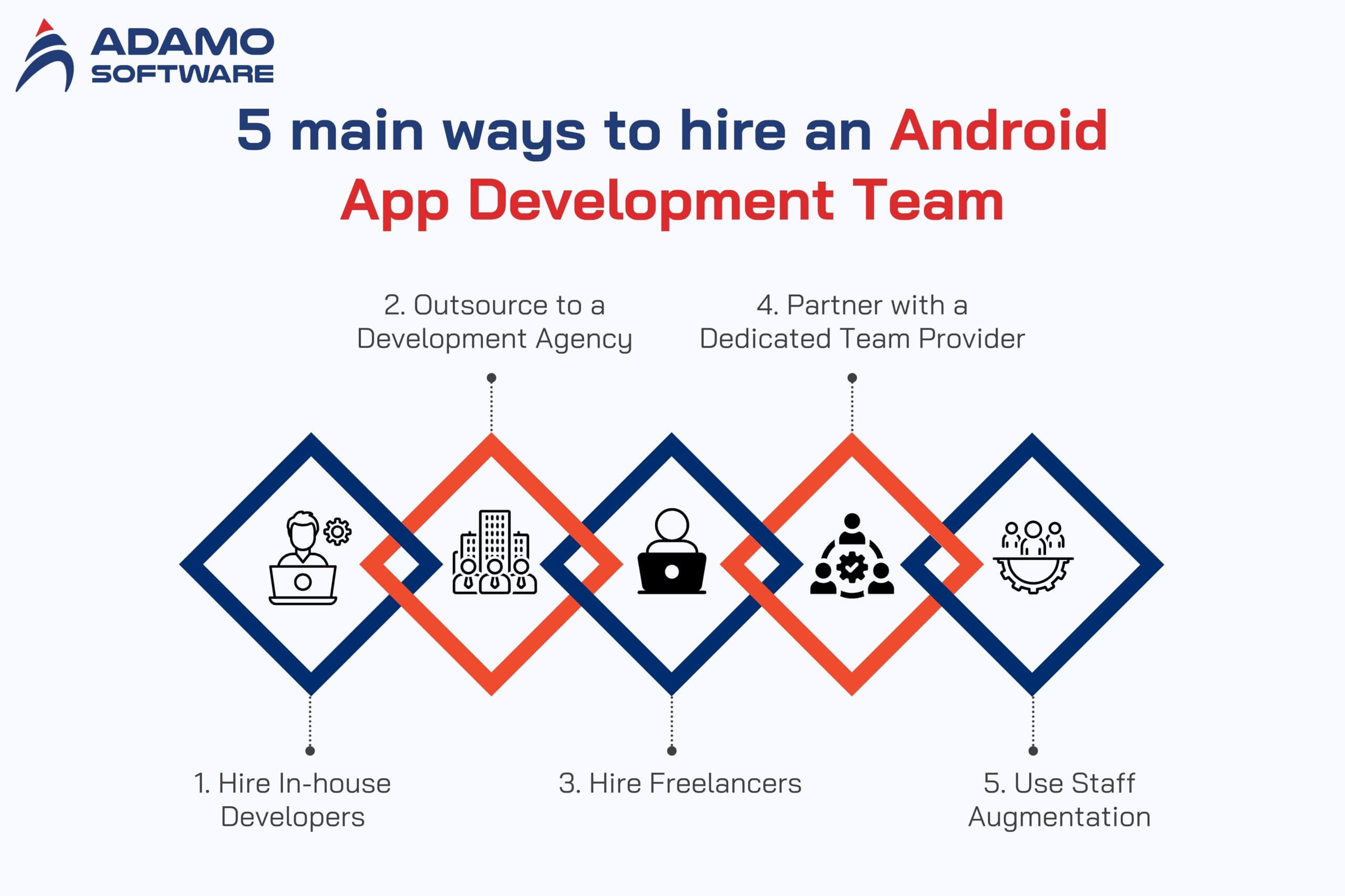
1. Hire In-House Developers
Creating an internal team for the development of the Android application requires. First of all, recruiting employees from within the company and committing to the task of creating this application. This is the best option for businesses that wish to have immense control over the development process.
Benefits:
- Face-to-face or post-manner communication with other individuals in the team.
- Improved working relations between your company and its clients.
- Quick access for updates or maintenance after the launch of the app.
Challenges:
- Increase the cost of salaries, benefits offered, and establishing the facilities.
- A long time is required to hire and get new employees on board.
That is why if your project is to be maintained for a long time or requires constant updates, creating an in-house Android app development team might be quite a suitable option.
2. Outsource to a Development Agency
Outsourcing means hiring a company that is experienced in developing Android applications. This is preferred by organizations that may not afford to recruit and train their team of experts.
Benefits:
- Full access to local and relevant developers or developers from around the world who possess experience in developing similar software.
- Shorter turnover time as compared to certain standardized schedules.
- Lower costs that come with it as compared to managing an in-house talent.
Challenges:
- Absence of tight control throughout development.
- Disagreements arise from inadequate communication owing to differences in the time zone or language.
It also suits organizations that require a quality application, but they have no capacity or knowledge on how to coordinate an Android app development team.
3. Hire Freelancers
Freelancers are independent consultants or workers without a fixed employer who work on a contract terms basis. For freelance Android developers, UI/UX designers, and QA testers, you will find that Upwork, Toptal, as well as Freelancer, contain tremendous freelance talent.
Benefits:
- Suitable for small projects or new business enterprises.
- The possibility to employ specific workers for certain tasks.
- To be able to tap into a global talent source.
Challenges:
- More limited compared to the agency’s or in-house teams’ responsibility.
- Coordinating with multiple freelancers can be very tiresome.
Android developers can be valuable for companies that require distinct services but don’t wish to pay to construct a complete team.
4. Partner with a Dedicated Team Provider
A dedicated team provider is a service that will collect the best professionals in Android app development and assign them to work on your project. All the effort, strategies, and ideologies put into your app are unique to the members of this dedicated team. However, they still work for the provider.
Benefits:
- Having all the advantages of outsourcing with a focus on specific services.
- The hiring of a complete team without committing to contract periods of long service provisions.
- Flexibility to expand or contract the number of workers in that particular team.
Challenges:
- More costly than traditional outsourcing but a little cheaper than offshoring.
- The dependence on the provider when it comes to forming and managing the team.
This choice is good for companies that require a widespread and targeted method of attracting an Android app development team.
5. Use Staff Augmentation
It offers additional human capital to your workforce temporarily in this model. This is a blend where you contract developers to join your staff for development until the job is complete.
Benefits:
- Builds upon the capability of the people you already have on board.
- More cost-imperative than recruiting an entire team of professional researchers.
- Ability to integrate well with your existing processes.
Challenges:
- Should have good internal coordination besides efficient external coordination.
- Defined and temporary employees can have different degrees of motivation to achieve development objectives.
This is a suitable arrangement for organizations that present employ a development crew but wish for an additional cadre in Android app development.
The method you need to use to hire your Android app development team depends on the size of your project, your budget, and your time frame. There are advantages of in-house teams, outsourcing, freelancers, dedicated providers, and staff augmentation all of which have pros. Knowledge of your project’s needs will assist you in determining that is best to enable your app to be developed by a competent Android app development team.
IV. How to hire the right Android mobile app development team
It is crucial to assemble the right Android app development team if you are going to have any success with your app. Thus, it may seem difficult to find a suitable team when there are so many choices out there. Otherwise, the process of searching, choosing, and even further utilizing the media becomes much easier when you already know what to look for and how to approach it. The following are the most crucial approaches to hiring the best Android app development team for your venture.
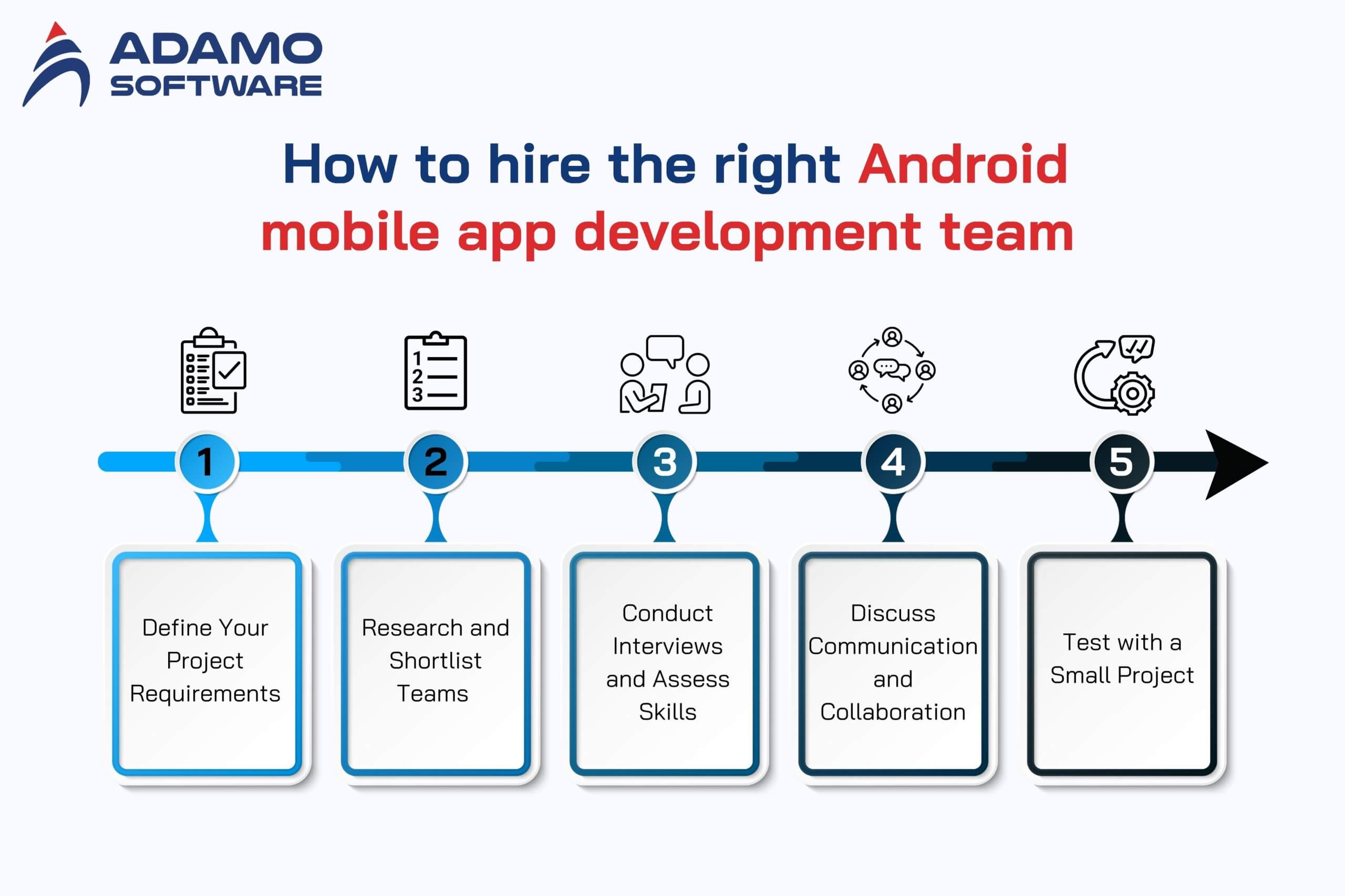
1. Define Your Project Requirements
First of all, while defining the critical parameters of the project, describe your needs and wants properly. This assists you in knowing which skills and expertise your Android app development team should possess/ embed.
Key steps include:
- Finding out the app’s purpose, target audience, and key features.
- Determining your budget and timeline.
- Listing specific technologies or tools you want your team to use, like Kotlin or Android Studio.
It also helps when proposing project teams where your expectations can be well defined and communicated having a well-laid down project plan. It also assists in eliminating unsuitable applicants who do not possess the required skills, or experience in the job field.
2. Research and Shortlist Teams
As your requirements are defined, you should begin the search for Android app development teams. The possibilities can range from agencies, through freelancers, to special teams for creating a project.
Tips for finding reliable teams:
- Check online reviews and testimonials on platforms like Clutch or GoodFirms.
- Look at the team’s portfolio to see if they’ve worked on similar projects.
- Evaluate their expertise in Android-specific technologies and design principles.
Choose the teams wisely concerning certain technical skills, experience, and results, which tally with the requirements of the project.
3. Conduct Interviews and Assess Skills
One of the important activities of the process is the conversation with possible candidates or with teams. It enables you to know their technical skills and how they express themselves.
What to evaluate during interviews:
- Experience with Android app development, including knowledge of Java or Kotlin.
- Understanding of Android guidelines, such as Material Design principles.
- Problem-solving skills and ability to handle challenges.
You should also evaluate their working style, their approach to project management, and how they intend to finish the projects on time. The best Android app development team should be experienced with coding and programming and at the same time, should be excellent team players.
4. Discuss Communication and Collaboration
Hence, communication is very important so that the project that you embark on is successful. Aside from that, the Android app development team you hire must define modes of working relations.
Key factors to discuss:
- Communication tools like Slack, Zoom, or Trello for regular updates.
- Reporting frequency (e.g., daily stand-ups or weekly progress reports).
- Availability to address queries or provide updates.
Avoiding the formation of a team, which may lead to numerous misunderstandings, has the following benefits for your project.
5. Test with a Small Project
If you want to work with a specific partner for a long time, it is better to start with a small-scale project or a simple task. This helps you to assess the quality of the work done by the team, and how reliable this team is for the job.
Benefits of a trial project:
- Understanding how the team handles real-world challenges.
- Assessing their ability to meet deadlines and maintain quality standards.
- Building trust and confidence in their skills.
If the team does a great job while completing the current project you can then continue with the full app development process with the best Android app development team.
Selecting the right team for the Android app development team takes time and effort. When you know your requirements and do some research to identify teams and their capabilities, you will discover a suitable team. Both communication and cooperation are invaluable in order not to harm the development process. By following these steps, it will be easier to hire the right Android app development team. They can deliver a successful app that meets the business objectives fixed for the venture.
V. Trends to consider in Android mobile app development
Android App Development always experiences transitions in the technologies that are used and the trends adopted when creating these applications. It means that keeping tabs on the trends is important to keep your app fresh and ready to take on what the users demand. These trends are important for any Android application development team, as applying them allows the production of innovative, yet efficient, applications. Here are some of the issues one needs to consider when developing an application for the Android platform.
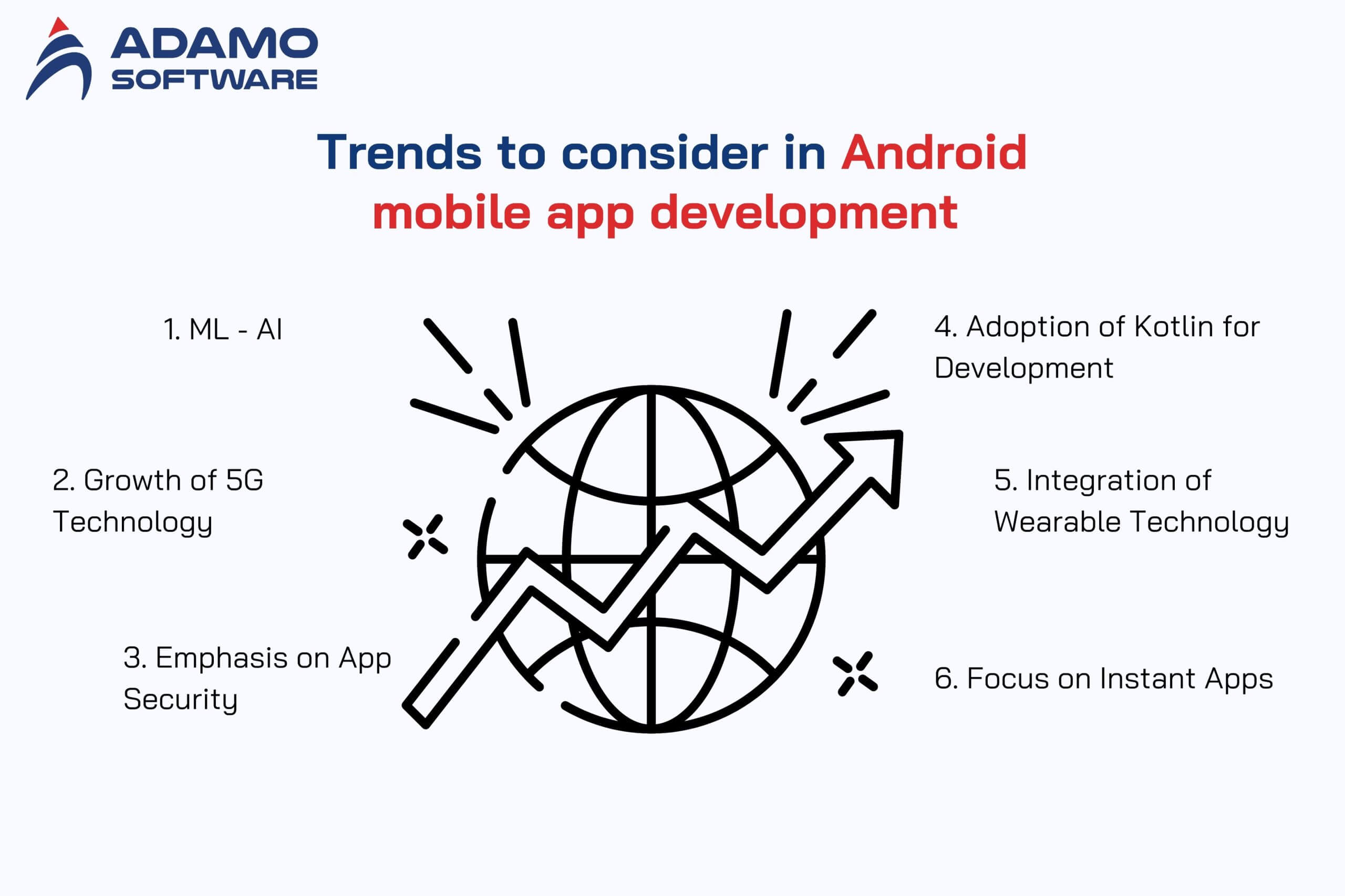
1. Machine Learning (ML) – Artificial Intelligence (AI)
AI and ML are revolutionizing how smartphone applications utilizing Android operating systems engage users. The former offers value through smarter, and more targeted, experiences.
How this impacts development:
- Integration of AI tools like chatbots for real-time user support.
- Advanced recommendation systems powered by ML algorithms.
- Understand user behavior and improve engagement with Predictive analytics.
An app development team that has expertise in developing apps for Android can opt for integrating these technologies and enable it to learn as it is used through AI and ML. Thus, it can create an app that will constantly be innovating and therefore improving user experience.
2. Growth of 5G Technology
Mobile apps’ speed and performance are getting a facelift due to the emergence of 5G networks. In specific, for an Android app development team, this opens new opportunities.
Key benefits of 5G for Android apps:
- Enhanced support for high-quality video streaming and real-time gaming.
- Faster data transfer for apps relying on cloud-based services.
- Improved IoT connectivity for smart devices.
Optimizing apps to 5G also means that our teams can guarantee that users will enjoy smooth and fast interactions with apps. This makes apps more attractive and useful.
3. Emphasis on App Security
While there is worry about accounting for a user’s data, app security is still sacrosanct. When using the apps, users expect that their details entered will not be shared amongst other users and third parties.
Security practices for Android apps:
- Implementing secure authentication methods like biometric logins.
- Encrypting sensitive data to prevent breaches.
- Regularly updating apps to address vulnerabilities.
An Android app development team that takes security seriously is trusted by users, received by regulations, and is reputable.
4. Adoption of Kotlin for Development
Many developers use Kotlin as it is far simpler to write code in Kotlin than in other programming languages used in Android development.
Why Kotlin matters:
- Faster development with fewer lines of code compared to Java.
- Improved app performance due to Kotlin’s efficient memory management.
- Strong support from Google, ensuring regular updates and compatibility.
When those working on an Android app development team are well conversant with Kotlin, they can make quality apps within the shortest time.
5. Integration of Wearable Technology
Smartwatches, and other wearable devices such as fitness bracelets, are growing in popularity. Applications for Android are starting to consider interacting with these devices.
Key considerations for wearable apps:
- Optimizing apps for smaller screens and limited interactions.
- Supporting health monitoring features like step tracking and heart rate monitoring.
- Ensuring seamless synchronization between wearable devices and smartphones.
On an Android app development team, wearing gadgets put into a different plane and opened up new markets in health and fitness fields and the like.
6. Focus on Instant Apps
Android Instant Apps enable users to experience the app without actually making the download. The same trend improves the user experience and makes apps more recognizable.
Advantages of Instant Apps:
- Users can access core features without installation, reducing friction.
- Easier for developers to showcase their app’s functionality.
- Improves app discovery and engagement.
To get to more users, an Android app development team can deploy Instant Apps to entice people to download the app and boost the all-important success ratio.
Knowledge of the trends is essential for any Android app development team to perform at the highest level in the constantly growing app market. All trends – from integrating AI into applications or using 5G networks to focusing on app security – pose considerable opportunities for improving the app’s performance and, therefore, users’ experience. Only by adopting these inventions can your team foster applications that speak to this demand and set your product apart from others based on the market.
VI. Why you should choose Adamo’s dedicated development team for building your Android app
Adamo Software’s exclusive team of Android app developers have vast experience in designing robust, secure, and easy-to-use business Android apps. Their depletes involve proficient developers who employ advanced technology and industry standards for creating excellent apps suitable for your company. With Adamo, the people working on your project are devoted to seeing the best results for your app, resulting in fast and high-quality work.
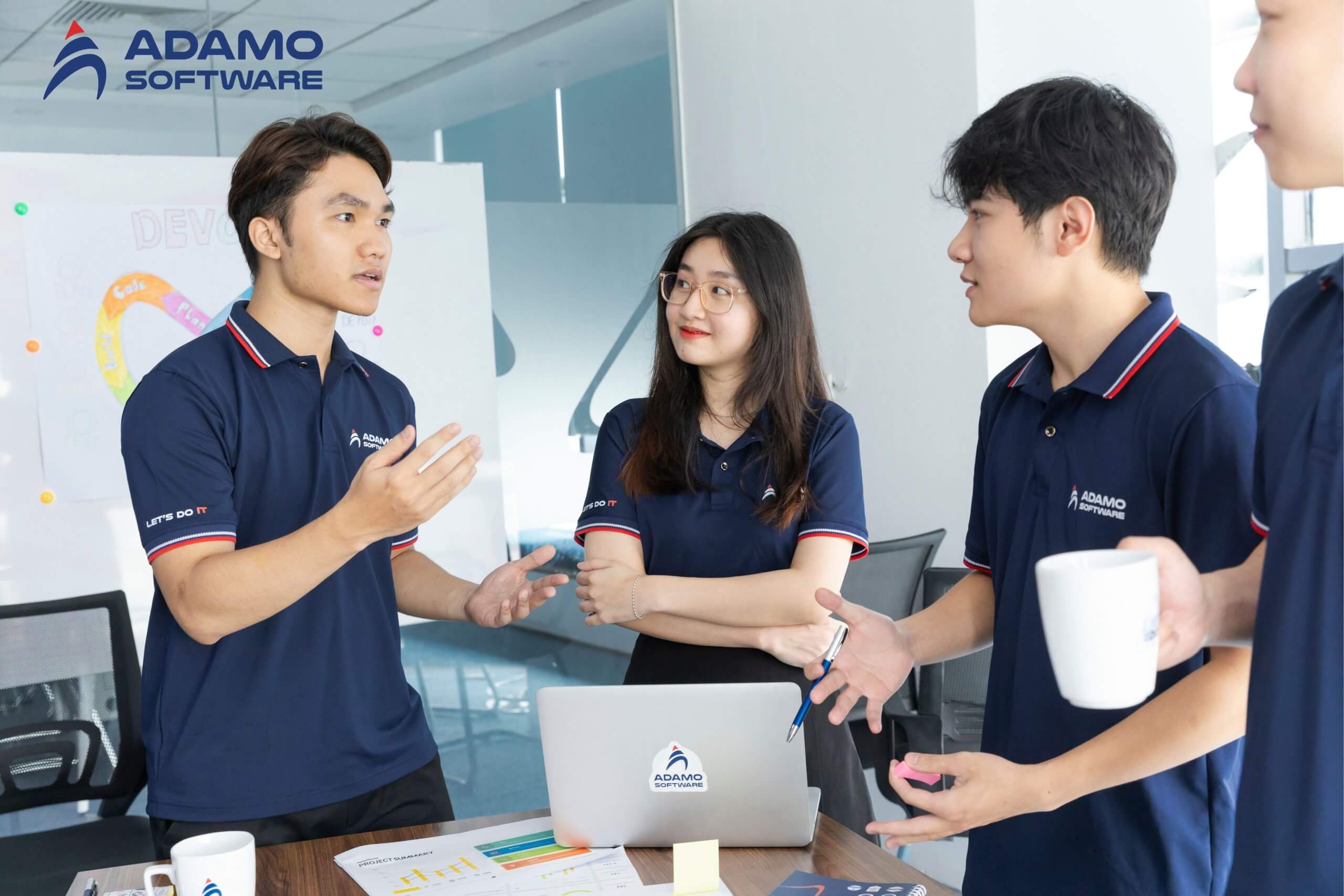
Everyone in Adamo’s Android app development team ensures that there is communication, clarity, and synergy in their developments. With the dedicated team working with you only, the vision of your app will be implemented successfully. We have faith in their competence and their success in delivering quality Android apps makes them a perfect partner for your next application.
FAQs
1. What is an Android app development team?
An Android app development team is a team of software engineers and specialists who are involved in the conception, designing, coding, leveraging, and supporting of Android applications. This might be developers, designers, project managers, quality assurance testers, and others with specific skills needed to develop a functional app.
2. How do I choose the best Android app development team?
Selection of the best Android app development team entails the establishment of the goals for the project, evaluating the skills of the team, and checking if the team has a history in the development of Android-based applications. Of course, experience and project samples are of great importance as well as their interaction with clients and general feedback. A good Android app development team should consist of people who are dedicated to your business goals and share them. They should also be open with you throughout the development process.
3. How much time do you need to develop an Android app?
The time to create an Android application can vary from several weeks to several months or even a year based on the app’s features, its functions, and the competence of the crew. Usually, creating a basic app will only take several months depending on the functionalities type involved in the creation process. Developing more complicated applications with extra tools and features may require additional time. Android App development is a complex process. It may require the attention of a professional team that is always ready to explain the timeline and regularly report the progress.
4. Why is it important to hire a dedicated Android app development team?
Engaging a professional team of Android app developers is a way of guaranteeing your project commitment, quality, and focus. Incorporating a dedicated team results in full engagement from the team together with timely delivery, quality output, and good problem-solving skills. Because of this commitment, you will find that their apps are better in performance and usability.
5. How much does it cost to hire an Android app development team?
The cost of hiring an Android application developer team depends on what country or state the team is in, its experience, and whether the project is small, medium, large, or big. Developers may charge by the hour or per project. There should be a conversation with the team about it and the team must make sure it states the exact cost of the entire project.





